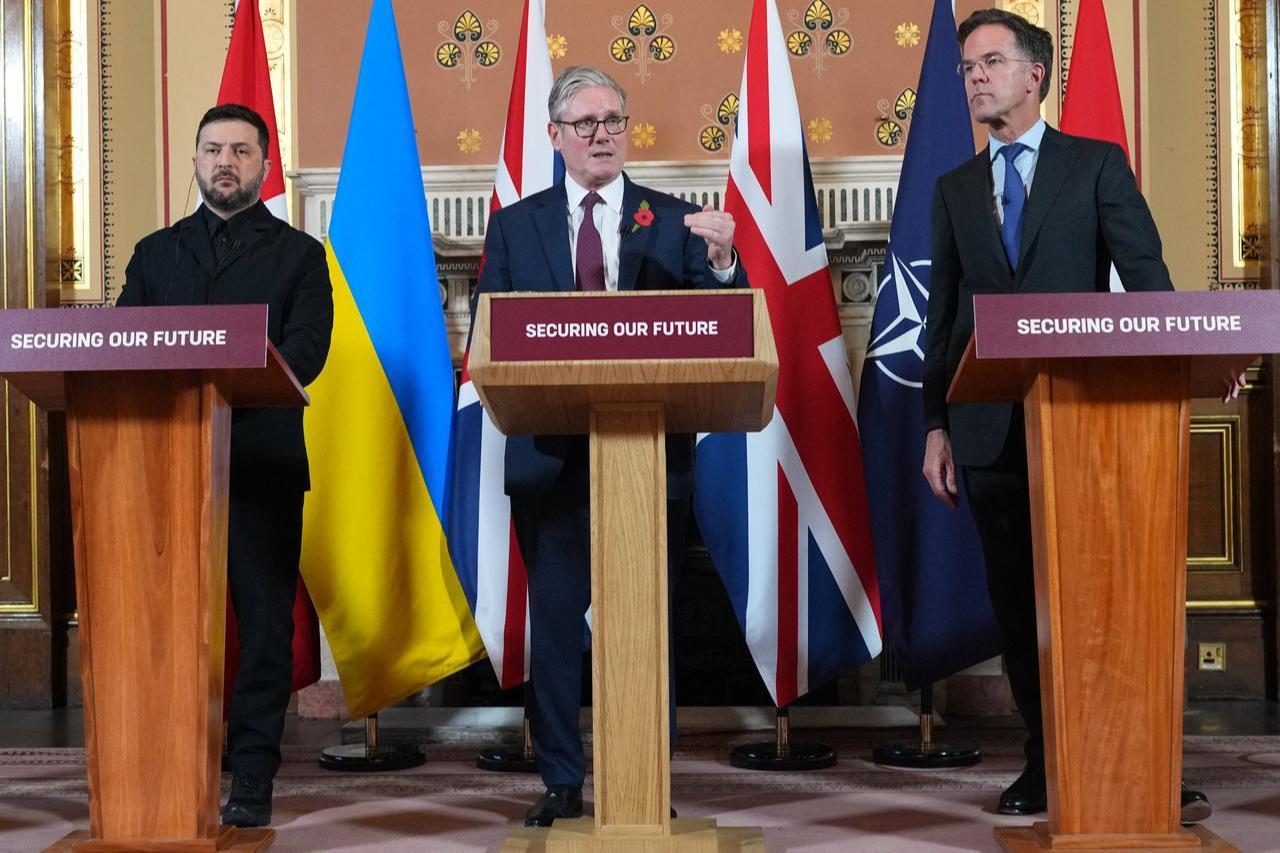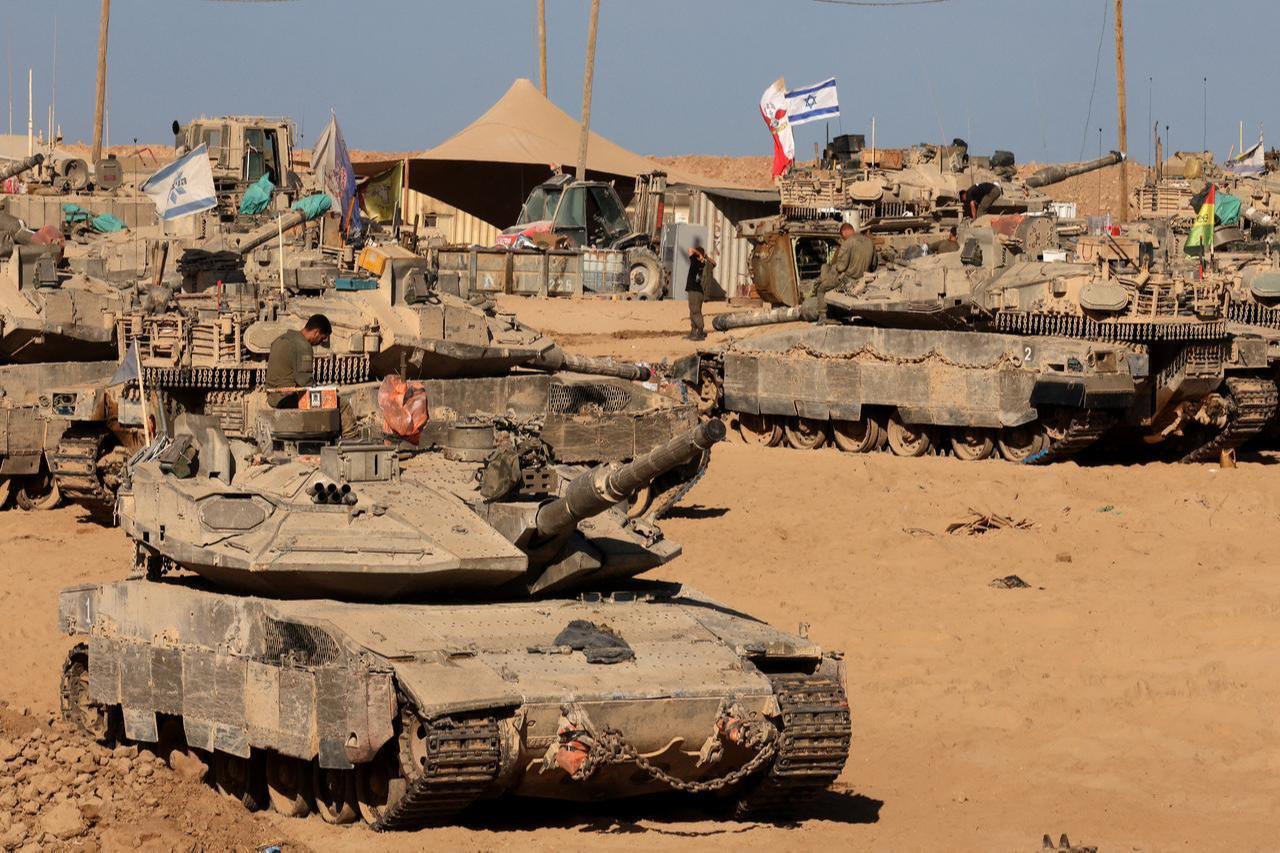
During his visit to Ankara on Oct. 27, U.K. Prime Minister Keir Starmer described the Eurofighter Typhoon agreement as an investment in NATO’s collective security, highlighting Türkiye’s vital role on the alliance’s south-eastern flank.
In parallel, London has moved beyond rhetoric: the U.K. Ministry of Defence has actively lobbied partners and signalled sustained political cover for the Eurofighter transfer, helping to coordinate the process with Ankara.
Against that backdrop, our interview turns to Major General Chip Chapman CB, a former Senior British Military Advisor at U.S. CENTCOM, where he worked directly with Gen. Jim Mattis, who later served as U.S. defense secretary, on coalition and regional strategy.
A 33-year British Army veteran and ex-head of Defense Ministry Counter Terrorism, Chapman served in command and staff posts up to alliance level and is recognized as a leading U.K. voice on strategy, deterrence and NATO.
‘The West still doesn’t understand Türkiye’
When asked how Britain views Türkiye’s rising military power and diplomatic reach, General Chapman wrote that the West still underestimates it. “Although Türkiye has always played a valued role on NATO’s southern flank,” he said, “most of the West’s understanding of Türkiye and its evolving military and international dynamics is limited.”
Western observers, he argued, follow neither its operations in Syria nor its campaign against the PKK, and have little grasp of how Türkiye’s support for Azerbaijan in the 2020 Nagorno-Karabakh war previewed the next era of warfare.
“That war, dominated almost entirely by drones, foreshadowed Ukraine,” he wrote. “Türkiye has shown its ability to punch above its weight. Lessons learned from those conflicts, allied to threat analysis, should be key determinants of force structure.”
Chapman sees Türkiye’s approach as more modern than many of its allies’. Western analysts, he said, still measure strength through Cold War metrics—brigades, divisions, inventories—while Türkiye measures it through agility. Its home-grown UAVs, Altay tank, MILGEM warships and upcoming KAAN fighter form not just an industrial base but a strategic doctrine of autonomy.
“The West still doesn’t really understand Türkiye,” he said again, “they know the cliches—Incirlik, the southern flank—but not the tempo, sophistication or reach.”
Eurofighter deal marks Türkiye’s rise as NATO’s strategic core
On the Typhoon deal itself, Chapman called it a natural extension of NATO’s need for interoperable air power. “Welcoming Türkiye as a Typhoon operator builds on bonds of friendship developed over many decades,” he wrote.
“Operationally, it strengthens NATO’s eastern air-defence network through improved alert coverage and sensor integration.” In his view, Türkiye adds connective tissue to the alliance’s deterrent architecture, not just new aircraft.
Diplomatically, he argued, Türkiye’s leverage is still undervalued. Its mediation between Russia and Ukraine, dialogue with Iran, efforts in the Caucasus and role in balancing Gulf rivalries show how Ankara combines force and diplomacy. “These are not side shows,” Chapman wrote. “They demonstrate a blend of capability and statecraft that adds real value to NATO and regional stability.”
I asked whether NATO fully recognizes that leverage or continues to treat Türkiye as merely transactional. “Ankara’s blend of high operational tempo, domestic industry and shuttle diplomacy is a force multiplier,” he replied. “The alliance should scale its doctrine and exercises accordingly—to match that agility.” NATO, he suggested, has as much to learn from Türkiye as Türkiye has from NATO.
Chapman acknowledged that Türkiye’s independence sometimes frustrates allies but called that complexity an advantage. “Diversity within NATO is a strength when harnessed properly,” he wrote. “Türkiye’s ability to engage both sides—Russia and Ukraine, Iran and the Gulf—gives the alliance reach it would otherwise lack.”
He believes Türkiye’s geography makes it indispensable: a bridge between Europe, the Middle East and the Black Sea. “If the Cold War was about holding the Fulda Gap,” he wrote, “today’s map is about holding the Ankara Axis. The West ignores that at its own risk.”
For Chapman, Türkiye is not a flank state or just a buyer of weapons but a model for how a mid-tier power can combine industry, tempo and diplomacy to multiply its influence. “Future NATO doctrine,” he concluded, “should reflect that blend—because that is what modern deterrence requires.”

From lightning strikes to grinding fronts
When I asked Gen. Chapman whether the wars of the 2020s were proving faster or slower than the theorists expected, he didn’t hesitate. Before Russia’s full-scale invasion, Western militaries had convinced themselves that precision, data, and artificial intelligence would make warfare almost instantaneous—“at the speed of light.”
In practice, he said, geography refused to cooperate. “What was expected to be Blitzkrieg has turned into Langsamerkrieg—a slow war.”
He explained that movement without detection has become nearly impossible. The battlefield is saturated with sensors and drones, making surprise a luxury.
Russia’s use of motorbikes and quad bikes, he said, is an attempt to bypass that reality—speed over armour, hoping to break through before being detected. “But that’s just a tactic,” he wrote. “It hasn’t produced any meaningful operational breakthrough.” The old currency of mass—the Battalion Tactical Group (BTG) that intelligence analysts once counted to measure Russia’s power — has lost relevance after staggering losses of men and equipment.
I asked whether Ukraine’s heavy investment in AI-enabled kill chains and drone-on-drone interception had shifted the balance. Chapman was cautious. “This is where the dilemma in force design lies,” he wrote. “When does the speed of innovation outpace the speed of obsolescence? What is the half-life of a modern force structure?”
He recalled a line once told to him by Gen. Jim Mattis—then commander of U.S. CENTCOM and later U.S. Defense Secretary: “Build where you’ll have the fewest big regrets when the crisis strikes—you’ll never have none, because war is fundamentally unpredictable.”
Amateurs talk strategy, professionals study logistics
By mid-2025, Russia’s offensives in Donetsk and Sumy had delivered mixed results—thousands of square kilometres gained on paper, but at a rate that bled men and materiel.
I asked whether such advances signaled real momentum or the beginning of culmination—that moment in doctrine when an army can no longer move forward because its logistics, manpower or morale have reached exhaustion.
“That’s the key question,” Chapman wrote. “The term strategic breaking point has been overused—and wrongly. Losing Bakhmut or Avdiivka wasn’t a strategic defeat; neither produced a strategic effect. Russia is now likely to miss two operational objectives in 2025: capturing all of Donetsk oblast and creating a lasting buffer zone.”
He returned, as he often does, to logistics. “All wars are wars of logistics. Bradley said it best—amateurs talk strategy, professionals study logistics. The challenge is to have the right support in the right place at the right time. How that’s delivered—by UAVs or remote vehicles—is secondary. What matters is assured sustainment.”
We discussed Trump’s repeated calls for a ceasefire—framed as “humanitarian peace.” Chapman acknowledged the human logic behind it but dismissed it as strategically naïve. “He first said it in May 2023,” he recalled.
“He doesn’t think in terms of winning or losing but of stopping the killing. That’s admirable on the level of human security, but it ignores seventy years of moral, ethical and international norms.”
Russia will miss both its 2025 objectives
All wars, he reminded, are fought for political objectives. “Putin’s grand strategic aim is to regain lost territories and spheres of influence. Russia is an imperial revanchist power. The Kremlin will continue to stall until it faces undue pressure—and that’s more likely to be economic than military.”
Chapman referred to the late John McCain’s remark that Russia is “a gas station with nukes, masquerading as a country.” That, he said, remains the clue to its real vulnerability—and why Ukraine’s deep-battle strikes against refineries and energy nodes matter.
“There will come a point,” he added, “when even Trump sees that Putin isn’t someone you can deal with.”
I asked what indicators would convince him that Moscow was negotiating in good faith. “None so far,” he wrote. “Estonia’s Kaja Kallas has been right for years—the Russians want negotiations, but not to negotiate. It’s the Gromyko approach: delay until surrender peace.”

Israel wins battles, but not peace
When I asked General Chapman about Israel’s strikes on Iran, he answered by returning to first principles. The attacks had been justified by Prime Minister Netanyahu as pre-emptive “self-defense”, yet the United States and the United Kingdom had offered no clear public evidence of an imminent Iranian threat. I wanted to understand how far international law could stretch before “anticipatory self-defense” became simply preventive war.
Chapman reminded that the U.N. Charter was meant to remove war from statecraft: “force is banned except by Security Council mandate or in self-defense under Article 51.”
He went on to recall the Caroline Test, the 19th-century principle that allows anticipatory self-defense only when a threat is instant, overwhelming, and leaves no choice of means. “That,” he said, “is the legal basis for Türkiye’s actions against the PKK, for example. Any response must remain proportionate, legitimate and necessary.”
From that framework, he turned to Israel. He noted that Tehran’s long-standing hostility—symbolized by the “Israel Destruction” clock in Palestine Square—gave Israel political and moral ground to justify its actions, even if the legal basis remains contested.
Geography, he added, leaves Israel little room for strategic manoeuvre: it cannot trade space for time, so it often uses warfare—the act of fighting—as a substitute for war, the pursuit of political ends.
“The failure to turn military success into political success,” he wrote, “has prevented any durable peace. When there is a shared well between all the Abrahamic religions, then you will have peace,” he concluded.
Responsibility first, mission second
That raised a different concern: Iran’s nuclear program still raises questions, and the B-2 strikes did not end regional hostility; plenty of targets remain across the theater. I asked whether the U.S. and U.K. could again find themselves in a joint military coalition, as they had in Iraq two decades earlier.
“There will always be coalitions,” Chapman replied, “but they are built on shared interests. The U.K. will join those only when its vital or major interests demand it. What each nation contributes is another matter entirely. “National caveats have always existed in coalition warfare, and they always will.”
Force protection, he stressed, is a permanent duty, not a temporary mission. “As General Mattis used to say, ‘force protection is a responsibility, not a mission.’ Failures happen for technical, procedural, or human reasons, but competence and integration can reduce them.”
He cited the partnership between Britain’s intelligence services and Counter-Terrorist Command as an example of effective coordination. “That collaboration,” he noted, “was decisive in uncovering the perpetrators of the Skripal poisoning.”
Strike claims outpaced the evidence
From coalition warfare we moved naturally to the intelligence that underpins it. The recent U.S. strikes on Iran had triggered a wave of conflicting assessments: U.S. Defense Intelligence Agency (DIA) analysts offered cautious briefings, while the White House declared total success. I asked how professionals should respond when politics demands certainty but evidence remains ambiguous.
“The line between military and intelligence work is clear,” Chapman wrote. “Since 9/11 the U.S. has grouped 18 agencies under one director, and the UK’s Joint Intelligence Committee plays a similar role.”
“What matters,” he continued, “is not who speaks loudest but what evidence supports the assessment—what sources and coverage were used, and what level of confidence attaches to each judgment.”
Politicians, he warned, routinely “embellish” intelligence for their own ends, citing the infamous Curveball case from the Iraq war. “Intelligence agencies do not,” he wrote.
“Analysts spend their careers trying to avoid the deadly sins of analysis—framing bias, confirmation bias, groupthink, fundamental attribution error. Politicians work in a world where all those biases are tools.”
The constant of Western policy toward Tehran, Chapman concluded, has remained unchanged since Obama’s time: Iran with the bomb is unacceptable. Within that intent lies a wide range of options, but the duty of intelligence is to remain “the sentinel, not the optimist.”